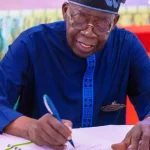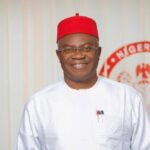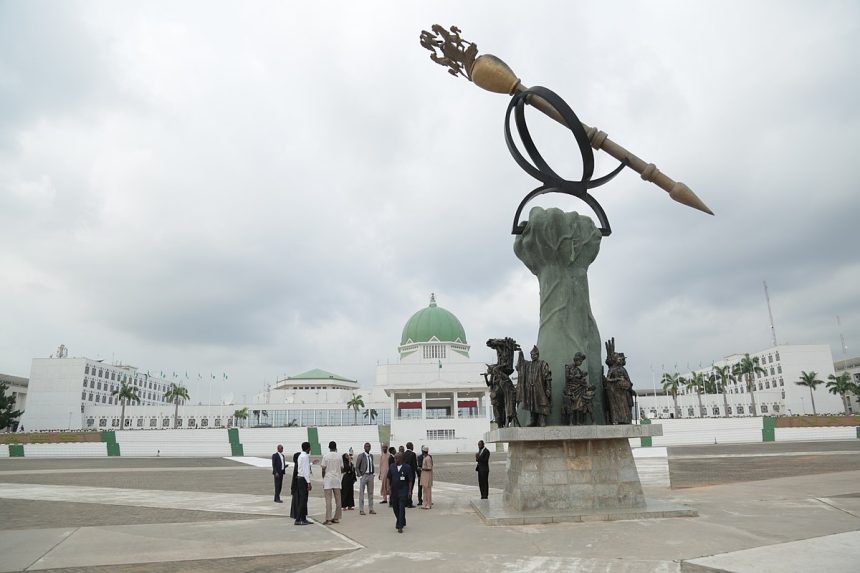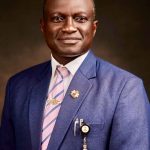The House of Representatives passed a bill on Thursday to reintroduce the old National Anthem “Nigeria, We Hail Thee” and replace the current one, “Arise O’ Compatriots.
Under the sponsorship of House Leader Hon. Julius Ihonvbere, the bill swiftly progressed through first and second readings. It was carefully deliberated and approved at the Committee of the Whole before advancing to its third reading during the plenary session.
The legislation is titled, “Bill For An Act to Provide for the National Anthem of Nigeria, and for Matters Related Thereto.”
The bill stipulates that upon its commencement, the national anthem of the Federal Republic of Nigeria shall be ‘Nigeria, We Hail Thee,’ as outlined in the Schedule of the proposed legislation.”
“The national anthem of the Federal Republic of Nigeria is recognized as a national symbol and a sign of authority. It is incumbent upon all individuals and corporate entities to honor and uphold the dignity of the national anthem.”
“The proposed legislation stipulates that the national anthem must be sung during key events, including the opening and closing ceremonies of the Federal Executive Council and State Executives Council meetings, as well as during the commencement and conclusion of legislative sessions in Nigeria, and constitutional oath-swearing ceremonies.”
“Such events include major celebrations, award ceremonies, commemorative ceremonies, national memorials organized by government agencies, significant diplomatic activities, major sporting events, and any other occasions designated by the Minister of Education with the President’s approval.”
It stated that the performance and singing of the national anthem shall follow the lyrics prescribed by the Federal Government of Nigeria.
“The new law mandates that during the national anthem:
(a) All present must stand respectfully and deport themselves appropriately.
(b) At flag-raising ceremonies, attendees must face the flag. Uniformed military personnel, police, and other security personnel are required to offer a hand salute, while others should observe with respect.”
“The Ministry overseeing information is tasked with coordinating the evaluation and endorsement of the national anthem’s performance standards. Additionally, they are responsible for recording the official rendition of the anthem for public use. These standardized guidelines and the official recording will be made available on the Federal Government of Nigeria’s official website.”
“Primary and secondary schools will integrate the national anthem’s lyrics into civic education, ensuring that pupils and students learn and understand its significance. Additionally, the second stanza of the former national anthem will be designated as the national prayer.”
In presenting the Bill, the House Leader emphasized that the current anthem instills a profound sense of commitment, dedication, and a collective aspiration to propel Nigeria forward, thus warranting a revision.
“Mr. Speaker, there comes a pivotal moment in the life of any organization or nation when its people must pause, reflect on the past, assess the present, envision the future, and summon the courage and collective wisdom to chart a path forward. I firmly believe that Nigeria has reached such a critical juncture and must seize this momentum to redefine and design its trajectory.”
“History has been shaped by great men. Esteemed Speaker, this bill is clear and direct. It proposes the elevation of our anthem to a national emblem, a symbol of unity, hope, and duty to our nation. Its passage will unite us and instill courage.”
“In contemporary societies, denial of reality is a prevalent issue. Many choose to ignore the existence of racism, ethnicity, and poverty, opting instead to focus solely on economic indicators like GMP and GDP. However, these realities are undeniable. To tackle them effectively, we must confront them head-on.”
“Amidst a renewed hope for Nigeria’s future, it becomes imperative for us as Nigerians to address the shortcomings of the past. This includes tackling decay, dislocation, and distortion head-on. One significant aspect worth revisiting is our old national anthem. Its stirring energy, commitment, and dedication have the potential to reignite our collective desire to propel Nigeria forward.”
“I have devoted time to scrutinizing both the old and new anthems, reflecting on my journey as a Nigerian deeply engaged in the quest for a better nation.”
“From my involvement in student union movements, including the ‘Ali Must Go’ campaign, to serving as Secretary, Vice Chairman, and Chairman of ASUU, to enduring twelve and a half years of self-imposed exile as a pro-democracy activist, my perspective is shaped by years of dedication to Nigeria’s progress.”
“I firmly believe that our original anthem encapsulates the essence of our collective struggle for a better Nigeria. After carefully examining both the old and the new anthems, it’s evident that they are intertwined with our journey towards progress and unity.”
“I also believe firmly that the original Nigerian anthem encapsulates, embodies, and radiates the very essence of energy, resourcefulness, and visionary spirit that our nation needs. Mr. Speaker, the original anthem not only instills a sense of pride in serving our country, a crucial sentiment especially in times when people are fleeing in all directions, but it also unequivocally affirms the sovereignty of our beloved motherland.”
Speaking against the bill, Minority Leader of the House, Kingsley Chinda, questioned its relevance during these challenging times.
He likened it to revisiting the old National Anthem issue, prompting the query: is this bill truly imperative amidst our current national circumstances? Chinda emphasized the necessity of addressing these pertinent questions to discern the potential value it would bring to the nation.
“Nigerians are counting on us to address fundamental issues for real change. Just as Prof led us through historical lessons, we must now consider the history we are poised to create. As a proud Nigerian, I stand against this bill and urge the House leader to withdraw it. Let’s scrutinize it thoroughly and act in the best interest of our nation.”
In his opposition to the Bill, Honorable Ahmed Satomi emphasized the need for its withdrawal, arguing that it fails to address the pressing issues confronting the nation.
Satomi highlighted the disconnect between the proposed legislation and the real challenges facing Nigerians. He questioned the relevance of a bill focused on the national anthem, especially when many citizens, including those in their forties, are unfamiliar with it.
He expressed skepticism about how such a bill would positively impact the lives of ordinary Nigerians.
“Let’s focus on practical measures to address hunger, banditry, and security challenges. Our priority should be initiatives that benefit the average Nigerian citizen. This Honourable chamber stands as a beacon for the common man in Nigeria, and it’s imperative that we take meaningful action to make a tangible difference in their lives.”
“As Nigerians look to us for leadership, I agree with the Minority Leader’s stance. Let’s focus on initiatives that will enhance Nigeria’s standing in the international community and drive development.”












